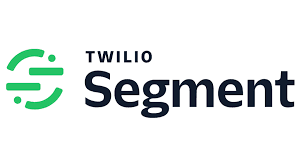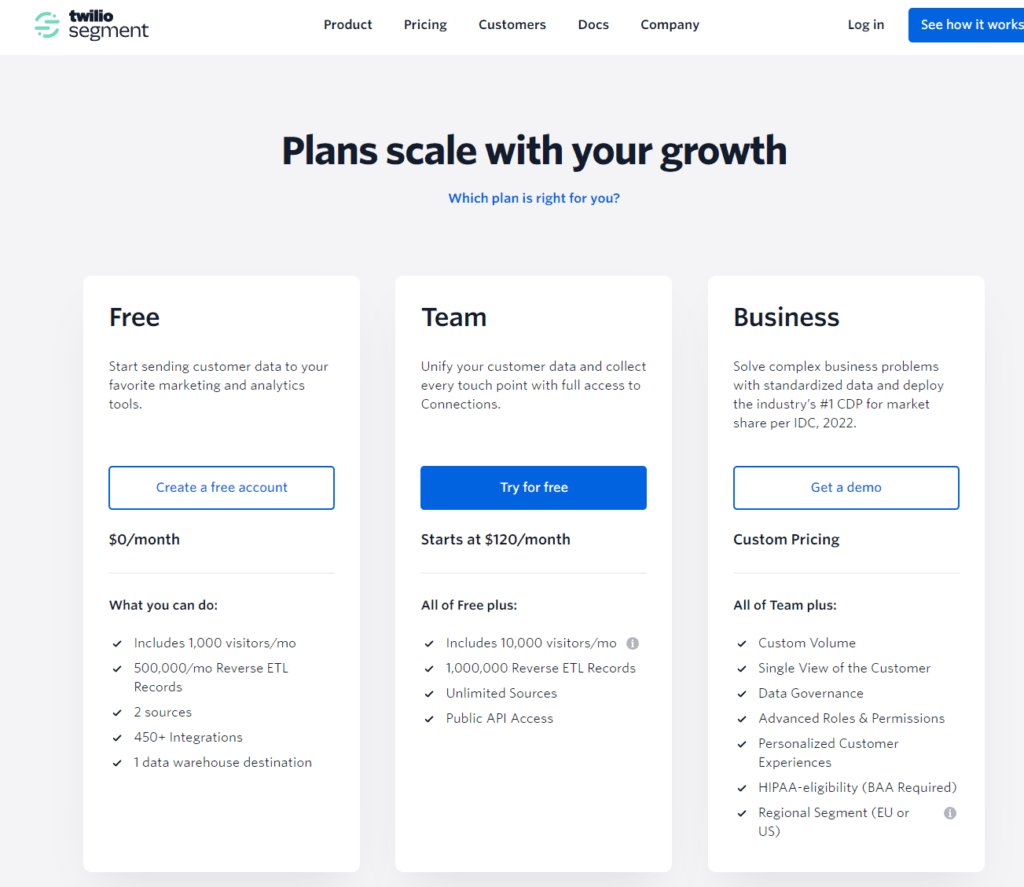In the ever-evolving landscape of digital marketing, the quest for the perfect analytics tool can feel like searching for a needle in a haystack. With businesses drowning in data from multiple channels, the clarity provided by an effective analytics solution is not just valuable; it’s indispensable. Enter Segment and Optimizely, two titans in the realm of analytics and experimentation, each offering unique strengths to illuminate the path to data-driven decision-making. Whether you’re fine-tuning your user experience or personalizing your marketing efforts, choosing between Segment and Optimizely could be the key to unlocking your data’s true potential.
Segment | Optimizely |
|---|---|
| G2 Score – 4.6 out of 5 stars | G2 Score – 4.5 out of 5 stars |
| TrustRadius Score – 8.3/10 | TrustRadius Score – 8.7/10 |
Experimentation and A/B Testing
The ability to test, learn, and iterate is at the heart of data-driven marketing. Experimentation and A/B testing capabilities allow businesses to make informed decisions based on actual user interactions rather than hunches.
Segment: The Data Foundation for Experimentation
Segment primarily serves as a customer data platform (CDP), focusing on collecting, unifying, and routing data across the tools in your stack. While not an experimentation platform in itself, Segment creates the data foundation necessary for effective A/B testing. It does this by ensuring that reliable, consistent data is fed into your experimentation tools, whether they’re part of your analytics suite, marketing automation platform, or a specialized A/B testing service.
Segment’s strength lies in its ability to centralize and standardize data from every touchpoint, providing a comprehensive view of the customer journey. This unified data stream is crucial for identifying where to run experiments and for analyzing the results across different platforms and tools.
Optimizely: Leading with Experimentation
Optimizely is renowned for its experimentation capabilities, offering a robust platform for A/B testing, multivariate testing, and personalization. It allows businesses to directly implement and measure the impact of changes on their websites and mobile apps, providing clear, actionable insights that drive optimization efforts. With its user-friendly interface, Optimizely makes it easy for teams to set up and run experiments, analyze results, and iterate on their findings.
The platform’s real power comes from its sophisticated targeting and segmentation capabilities, enabling highly personalized experiments that can lead to significant improvements in user experience and conversion rates. For businesses looking to embed experimentation at the core of their strategy, Optimizely offers the tools and insights needed to foster a culture of data-driven improvement.
Personalization and User Experience Optimization
In an era where customer experience can be a significant differentiator for businesses, the ability to personalize digital experiences and optimize them for each user becomes invaluable. Let’s see how Segment and Optimizely support these goals.
Segment: The Foundation for Personalization
Segment, at its core, is a customer data platform (CDP) that collects, unifies, and channels data from multiple sources to various analytics and marketing tools. While it doesn’t directly offer personalization features, its strength lies in providing the detailed, segmented user data that is essential for personalization efforts.
By integrating with a wide array of tools, Segment allows businesses to leverage the collected data for personalized marketing campaigns, content customization, and targeted product recommendations. The quality and depth of the data available through Segment can significantly enhance personalization strategies, making it possible to tailor digital experiences to individual user preferences and behaviors, although this requires the use of additional platforms that specialize in personalization.
Optimizely: Direct Personalization and Optimization
Optimizely goes beyond testing to offer robust personalization capabilities directly within its platform. It enables businesses to not only identify which variations perform best but also to implement personalized experiences at scale based on user behavior, demographics, and other data points.
With its experimentation and personalization tools, Optimizely allows marketers to dynamically adjust website content, messages, and offers to match individual user profiles, driving improved engagement and conversion rates. The platform’s analytics also provide insights into how these personalized experiences impact user behavior, offering a loop of continuous optimization.

Related: Check out our free SEO suite

Analytics and Reporting Capabilities
The strength of an analytics tool lies not just in data collection but in how it analyzes and presents that data, turning raw numbers into actionable insights.
Segment: Data Routing for Comprehensive Analysis
Segment’s primary function as a customer data platform is to collect data from various sources and route it to different analytics and marketing tools. It doesn’t provide analytics and reporting features directly within its platform. However, Segment’s power lies in its ability to ensure that the data fed into your analytics tools is clean, comprehensive, and well-structured, enhancing the quality of insights you can derive.
By integrating with a wide array of analytics platforms, Segment enables businesses to choose the best tools for their specific needs, from general web analytics to more specialized solutions for funnel analysis, customer retention, and more. This flexibility allows for a customized analytics setup that can provide deep insights across various aspects of your business.
Segment primarily serves as a robust customer data platform, where its main prowess lies not in generating reports itself but in its ability to collect, clean, and route data to where it’s most needed. This includes a plethora of analytics tools where data can be dissected and analyzed. The true power of Segment in the context of analytics and reporting comes from its versatility in feeding accurate and comprehensive data into specialized analytics platforms.
Optimizely: Integrated Analytics for Experimentation and Personalization
Optimizely, known for its experimentation and personalization capabilities, also offers robust analytics and reporting features that are directly integrated with its testing tools. This integration provides immediate insights into the performance of different experiments and personalized experiences, offering clear, actionable data on what works best for engaging and converting users.
Optimizely’s analytics tools are designed to be accessible to marketers and product teams, with clear dashboards and reports that highlight key performance indicators, experiment results, and the impact of personalized experiences. This focus on actionable insights supports a cycle of continuous improvement, where data from analytics informs new tests and personalization strategies.
Optimizely’s analytics tools are designed to highlight key performance indicators, conversion metrics, and the overall effectiveness of different variations, all within an accessible and user-friendly interface. For businesses focused on optimizing their digital experiences, Optimizely’s built-in analytics offer the convenience of having experimentation and analysis in one place, enabling quick iterations and informed decision-making based on real-time data.
Cost-Effectiveness and ROI
Evaluating the cost-effectiveness of Segment versus Optimizely requires a consideration of both platforms’ pricing structures and the potential return on investment they offer through enhanced marketing performance and customer insights. The investment in any analytics tool should not only fit within your budget but also offer a return that justifies its cost, both in terms of monetary investment and the time and resources spent on integration, learning, and daily use.
Segment: Flexible Pricing with a Focus on Data Integration
Segment offers a tiered pricing model that starts with a free plan suitable for small startups and scales up to more advanced packages designed for larger enterprises with complex data integration needs. The cost increases based on the number of sources from which you’re collecting data, the volume of data processed, and the level of support and customization required.
The ROI from using Segment comes from its ability to streamline data flows across tools and platforms, improving data accuracy and the effectiveness of other marketing and analytics tools. For businesses that rely on a diverse stack of applications to manage their marketing, sales, and customer service, Segment can offer significant value by reducing data silos and enhancing overall data utility.
Optimizely: Investment in Experimentation and Personalization
Optimizely’s pricing is not publicly disclosed and typically requires a custom quote, reflecting its positioning as an enterprise-level solution for experimentation and personalization. The cost is based on the features and scale of use, including the number of experiments run and the volume of data analyzed.
The potential ROI from Optimizely is tied to its direct impact on conversion rates, customer engagement, and ultimately, revenue through optimized user experiences and targeted personalization. For companies with the resources to invest in a sophisticated testing platform, Optimizely can drive significant improvements in online performance, justifying its cost through direct impacts on business outcomes.
Future Scalability and Flexibility
As your business evolves, your analytics and optimization needs will also change. The platform you choose should not only meet your current needs but also have the capacity to adapt and scale with you.
Segment: Built for Growth and Scalability
Segment is designed with scalability in mind. Its infrastructure supports businesses of all sizes, from startups just beginning to collect customer data to large enterprises managing millions of interactions daily. The platform’s flexibility lies in its extensive integrations and data routing capabilities, allowing businesses to add new tools and services as their needs evolve without significant overhauls to their data infrastructure.
The ROI from Segment increases over time as businesses grow and their data ecosystems become more complex. Its ability to centralize and standardize data across numerous sources and destinations becomes increasingly valuable, providing a solid foundation for data-driven decision-making at scale.
Optimizely: Adaptable to Changing Experimentation Needs
Optimizely’s platform is also built to scale, offering robust experimentation and personalization features that can accommodate businesses as they expand. Optimizely’s flexibility is evident in its wide range of testing capabilities, from simple A/B tests to more complex multivariate experiments, making it suitable for businesses at different stages of maturity in their optimization journey.
As companies grow and their website traffic increases, Optimizely’s infrastructure can handle the added complexity, ensuring that businesses can continue to deliver optimized experiences without performance issues. The platform’s adaptability to changing marketing strategies and goals allows businesses to continuously refine and improve their customer interactions.
Pricing
Segment:

Optimizely:

Conclusion
In conclusion, when deciding between Segment and Optimizely for your analytics and optimization needs, it’s crucial to align your choice with your business’s strategic goals and operational requirements. Segment stands out for its robust data integration capabilities, making it ideal for businesses seeking to centralize and leverage their data across a diverse tech stack for comprehensive analysis. On the other hand, Optimizely excels in offering a focused solution for conducting experiments and personalizing user experiences, supported by integrated analytics that enable quick, data-driven decisions.
The decision hinges on whether your priority is building a versatile data foundation with Segment or directly improving digital experiences through experimentation and personalization with Optimizely. Both platforms offer distinct paths to harnessing the power of data, but the best choice depends on your business’s unique needs and how you plan to use analytics to drive growth and success in the digital landscape.
Read Next:
- GetResponse vs Zoho Campaigns: The Best Email Marketing Tool for 2024
- AWeber vs ActiveCampaign: The Best Email Marketing Tool
- Constant Contact vs Campaigner: Best Email Marketing Tool
- GetResponse vs Omnisend: The Best Email Marketing Tool for 2024
- AWeber vs Benchmark Email: The Best Email Marketing Tool






















Comments are closed.